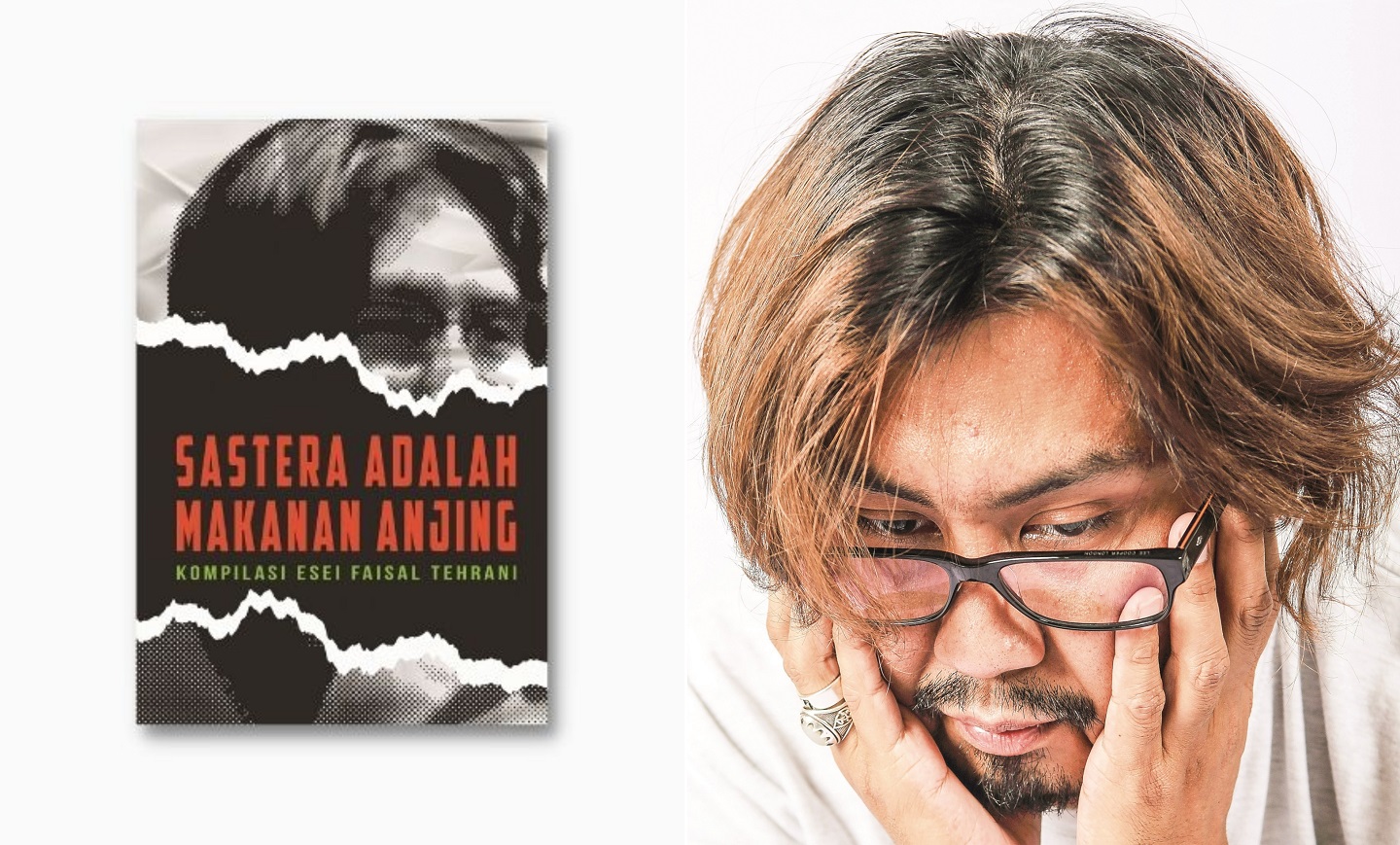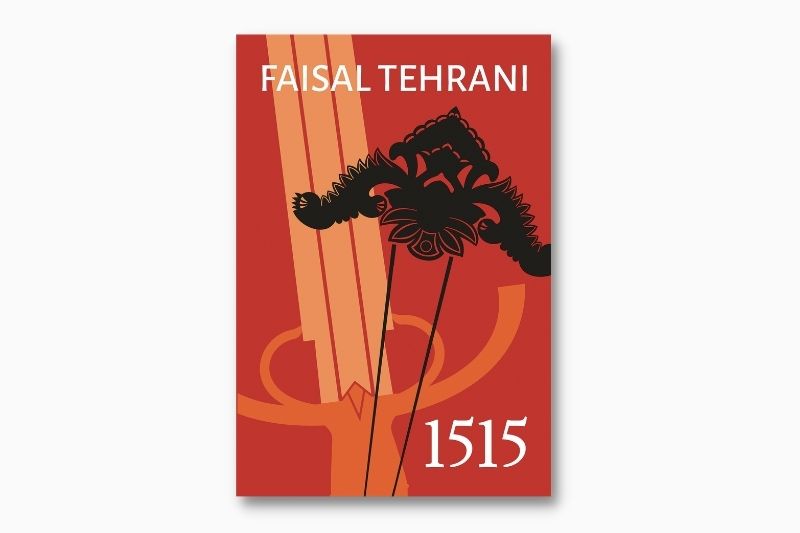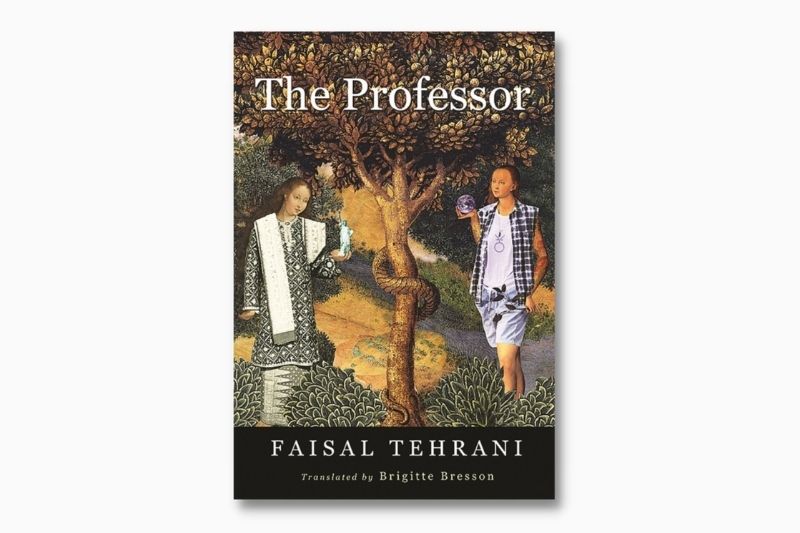
Faisal released Sastera Adalah Makanan Anjing early this year (Photo: Gerak Budaya; Faisal Tehrani)
Having seven books banned out of the more than 30 to his name was a sore point for writer Faisal Tehrani. What rubbed salt into the wound was that no one from the fraternity rallied around him.
“I felt dejected, peeved and abandoned by fellow writers when my freedom of artistic expression was being violated. When my books were banned, I had to fight for my rights all alone. To me, that was a tragedy, a scholastic disaster.”
Justice prevailed when Faisal took his case to court and four titles were reinstated in January 2018. But the experience left a bad taste in his mouth and led to Sastera Adalah Makanan Anjing, one of 44 essays in his latest book, named after the titular piece, released early this year.
“After May 2018, whenever someone said literature is for the betterment of society — you know, the kind of tone to fit the Pakatan Harapan (PH) days — I felt insulted. The truth is, literature has been dog’s food. The irony is, we don’t even feed litter to our pets.”
Politics, culture and themes such as feudalism, oppression, extremism and violence are discussed in the collection, which he started working on before PH took over the government.
“Literature is about mankind, so it should be provocative. Artistic creation is an ultra-natural activity, a huge and tiring process of cognition. The essays here are not only about being human, but becoming human. Determinants of that come from nature, history, our way of life, faith, the self and our understanding of society.”
Fiction serves as a reminder of what happened before and could happen again, he says. “As we are talking now, Kabul has fallen into the hands of the Taliban. That’s scary, and crazy. So, although my essays are a reflection of the dark days pre-Pakatan, they can reflect what is happening today.”
Which brings readers to why Faisal — real name Dr Mohd Faizal Musa, a research fellow at the Institute of Malay World and Civilisation, Universiti Kebangsaan Malaysia (UKM) — writes.
“I write to reach perfection. Not self-perfection, but perfection for society. It’s a difficult task. Writing is the only sensible means for me to be disobedient and civilised at the same time.”
Disobedience — going against the “norm” and espousing ideas contrary to those held by the majority — was behind Faisal’s tumble from being the “poster boy” of Malay literature to outsider, after the Home Ministry in 2014 imposed the first ban on his work, Perempuan Nan Bercinta, because “it may be detrimental to public order and public interest”.
The 2012 novel, which centres on feminism and Shia Islam, is still prohibited, as are Aku ___, Maka Aku Ada! (a collection of articles and essays on politics, and religious and LGBT issues) and Sinema Spiritual (dramaturgy and film criticism from Islamic perspectives).
Faisal’s fall from grace was sealed by the 2014 publication of Bagaimana Anyss Naik Ke Langit, about logging and the plight of the Penans in Sarawak. An English translation by Brigitte Bresson (How Anyss Went to Heaven; Dubooks) came out in 2016. Call it serendipity: His newfound purpose as an “accidental” human rights defender coincided with the start of the third phase of his writing career.
Retracing his transition, he says: “I started writing during my high school days. I was very naïve and followed in the footsteps of many writers before me. Thankfully, I learnt from the best.
“In my early days, I crafted healthy nationalism in my fiction. In the second phase of my career, my conservative days, I wrote mostly Islamic works. Nowadays, as a reformed and repented author, I hope I can speak or write for all.”
Reform, for him, meant shifting from traditional ideas and views on Islam to those with “progressive tones”. The winner of the 2006 Anugerah Seni Negara and 2005 National Book Award for his unique take on Malay history and identity in the novel 1515, says: “I looked at myself, my carelessness, my mistakes. A man of letters must have the courage to admit his mistakes and change the course of his path. I revolutionised myself and moved from the second to the third phase of my career.”
Faisal, who turned 47 on Aug 7, did shariah politics at Universiti Malaya and a master of arts at Universiti Sains Malaysia. He obtained his PhD in philosophy from UKM, where he is doing research on the Shiite minority in the Malay world.
His writings are often associated with Shia ideology, a fact he does not deny. An Aug 28, 2017 report in The Jakarta Post quoted him as saying: “Islam is a religion that is immune to opposition, criticism, disagreements or even ridicule from insiders and outsiders. I believe my religion has this capacity, but the Malay clerics can be easily offended.”
In 2018, he told Malaysiakini that he wrote because he felt the government and clergy were “leading people down a path full of negligence”. Looking around him today, would he say things have become worse?
books_800px_2.jpg

“We are definitely going down the drain. So many things should be set right again. Democracy has been threatened, human rights have been abandoned, religion has been ridden, and the economy has become worse.
“We need to look back to our history. We have been careless, and our mistakes are coming back to haunt us. They will haunt the future generations.
“What went wrong in Malaysia? I wish I could list all the reasons, but the most important is there is no equity. A society with equity is one where everyone has the opportunity to develop their talents and potential, and where everyone occupies the social position they deserve. There is no equity for all races, for Malaysians.”
But Faisal still believes in possibilities. And he is convinced that dialogue can bring about change.
“The only way forward is to understand each other. Dialogues are not debates; we are not seeking champions. We want to understand so we will not alienate others, especially the minorities. Stories are the bridge to connect us.
“I still have hope. We must not stop looking for perfection for society and our country. Humans are creative and have been given the potential to fully revolt against evilness. We should not be tired.”
The beauty of being an outsider, he says, is that although he has lost a significant number of old readers, fresh ones have come forward, eager to know more about his books. “They call me friend and brother. Nowadays, I am committed to the betterment of our society. I’m glad that I was profoundly challenged during those difficult days.”
As a scholar who spent years poring over books written by wise men before he learnt that Islam is broader than what people assume, how can he open the minds of those who only hear dogmatic sermons?
“This is the duty of the intelligentsia. By intelligentsia, I do not mean the scholars or intellectuals only. Literate or illiterate, all of us have roles. Scholar or layman, we have responsibilities. How do we wake people up from slumber? By making them understand the real Islam, which is all about championing the oppressed, the poor, those in need. It is never about the elite or certain ethnic groups or races. It is never about the believers and non-believers. Islam is not only about jurisprudence.
“My role is to write. As stories and ideas are permanent, I choose literature. Others must get involved too. All of us. Those who read my writing, for instance, must tell others about them.”
No one can afford to be apolitical or say he does not care. “If a person does not oppose oppression and inequality through his words or deeds, he is on the side of the oppressor,” adds Faisal, who is inclined towards political novels and loves reading Mo Yan, Jose Saramago, Kenzaburo Oe and Toni Morrison.
books_800px_1.jpg

“For some reason that is difficult to explain, I read Gabriel Garcia Marquez over and over again. Another writer I never tire of is Witi Ihimaera. Stories are so important. They make us alive. They make us dream and put us in a timeless space with a lot of lessons to pick from.
“Yes, literature won’t put potatoes and vegetables on your plate but writers struggling together with the people through bad times can help them make sense of what’s happening. When we deviate, literature is the manual [to lead us back].”
A few of Faisal’s creative works are available in French, Mandarin, German and Bahasa Indonesia and he has written academic books in English but he does not consider himself bilingual.
On his nom de plume, he says: “I read lots of Persian works during my teenage days and my companions started calling me Tehrani, derived from Tehran [capital of Iran, formerly Persia]. The name has not ceased giving me luck.”
With luck, the pandemic will not delay the English edition of Sastera Adalah Makanan Anjing (Gerakbudaya), which Bresson is working on. She also translated his Professor (Fixi, 2017), “a meditation on the meaning of justice, sexuality and religion in a society increasingly dominated by extremism”, into English (The Professor; Gerakbudaya, 2020).
What motivates Faisal, whose own creative freedom is infringed, to keep fighting: anger, passion and a stoic sense of justice?
“My God, what else? I refuse to believe that Victor Hugo wrote Les Miserables in relaxed, comfortable and convenient conditions.
“As for controversy, I don’t look for it. They just tail me. It’s not that I don’t scold them or ask them to quit. They’re just stubborn and opt to track and trail me.”
Which can be wearying, sometimes. “I get tired, yes. But I am obsessed with perfection and I can only find perfection in words.
“I wish it was easier. I wish I were the prime minister, offering false perfections and cheating the people with televised and recorded statements. But I loathe politics; most of us do. I have just got to accept that I’m a writer and although tired, I have to carry on. A writer, thankfully, can never resign.”
To refresh mind, heart and soul, Faisal indulges in more wishful thinking. “I wish I was agented and can sell a million copies of my books so I can settle down and write in Bergamo, Italy. But here I am, answering questions and hoping that this crazy mind of mine, if fortunate enough, will catch the attention of a few readers.”
Purchase 'Sastera Adalah Makanan Anjing' for RM38 at Gerakbudaya here.
This article first appeared on Aug 23, 2021 in The Edge Malaysia.


